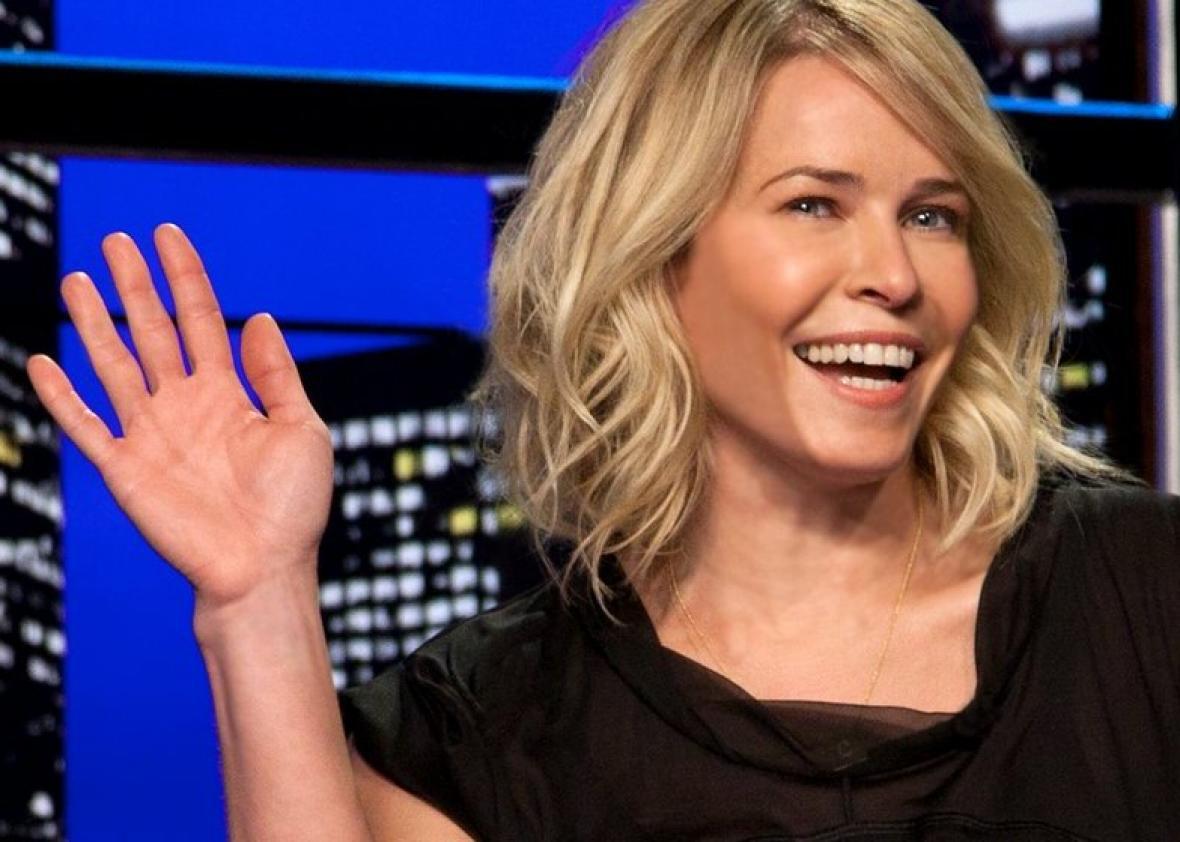Calling Chelsea, the new show hosted by Chelsea Handler and airing on Netflix three times a week, a late show is a kind of useful fiction. In the first episode—which arrived on Netflix at 12:01 a.m. Pacific time, the time the show will appear around the world every Wednesday, Thursday, and Friday—Handler described herself as a “late-night TV host that doesn’t want to be tied down by time, or television, or hosting,” which, one might have assumed, were the requisite elements of being a late-night TV host. But Chelsea is trying to prove otherwise, hoping that “late-night host” can become like “video” or “record,” terms that have outlasted the specific formats they once described. Or, another way to think of it: Netflix is “disrupting” the late-night industry by making just another late-night show.
Given that Chelsea does not air at night or on television, its late-night bona fides are established by its aspirations and format: It’s an adult-themed talk show that takes place before a live studio audience, with a host who stands and talks, then sits at a desk and talks, and then sits in a chair and talks to celebrity guests, interspersed with various pretaped bits. The structure is so familiar that after wrapping up a conversation with Gwyneth Paltrow and Tony Hale, Handler tried to throw to a commercial break that didn’t exist. Instead, the screen cut to black for a second.
Handler, who was the host of a late-night show on E! for many years, showcases her own brash personality, hang-ups, and celebrity friends more than most (male, relatively circumspect) late-night hosts do. Late night is a known boys club, and while Handler’s sensibility and interests have a female slant—Handler and Paltrow discuss, for example, where lube eventually goes—she makes no overt mention of late night’s skewed gender demographics. Chelsea, some broadsides at Trump notwithstanding, is not a topical show. Handler’s monologue in the second episode was a conversation with her studio audience about the kind of narcotic sleep aids they use. Handler does not work, as most late-night show hosts do, as a filter through which to view current events or celebrities: On her show, she is the current event, she is the celebrity. She talks as much or more than the people she interviews. Her dog wanders the set. In the first episode, she has the secretary of education quiz her on trivia.
Chelsea is theoretically well-positioned to capitalize on the reality of how late-night shows are often consumed these days: the morning after, in viral video bits. But Chelsea instead makes plain that while Netflix may be able to ape the networks, it still doesn’t have a solution to YouTube. How do you get the best bits of Chelsea the morning after, presuming that such best bits will eventually exist? Based only on the sample size of two episodes, Chelsea is remarkably unviral. The first episodes have a couple of pretaped sketches that are varying degrees of bad. A long sketch of Chelsea going to school to learn how to act in a telenovela, without speaking any Spanish, ran painfully long. Chelsea doesn’t have commercials, but it did include numerous bits pushing Netflix. (For $9.99 a month you can attend “Netflix University!”) Handler has a lot of celebrity friends, but even her interviews with them were flat. Over a glass of rosé, she told Drew Barrymore that everyone in the world is rooting for her. In the cardinal sin of celebrity interviewing, she asked Gwyneth Paltrow and Tony Hale to each share their pet causes.
Chelsea Handler is the sort of person about whom people tend to have strong feelings: You like her or you don’t and will watch Chelsea accordingly. But Chelsea is interesting beyond its specifics, as a Netflix experiment. Why does Netflix need a late-night show? It already offers hundreds of hours of late-night programming, given that you can watch anything on it, late at night. But as Netflix continues its quest to take over all of television, the greatest obstacles to it are those formats whose timeliness is their very essence: Live sports is the big one, late night a minor one. With Chelsea, Netflix is exploring, figuring out how it might best provide a series that is not explicitly designed to be binged.
Netflix first started making original content with Lilyhammer, a not-so-special but perfectly professional show about a mobster who goes into witness protection in Norway. With that series and with the much higher profile show that followed it—House of Cards—Netflix wanted to establish that it could make original dramatic content: not necessarily radical original dramatic content but respectable original dramatic content. For all of Netflix’s success and prophesies that it would change how television is made, it has yet to significantly alter the form of TV shows. With Chelsea, Netflix is demonstrating that it too can make a late-night show—even if it didn’t need to.
